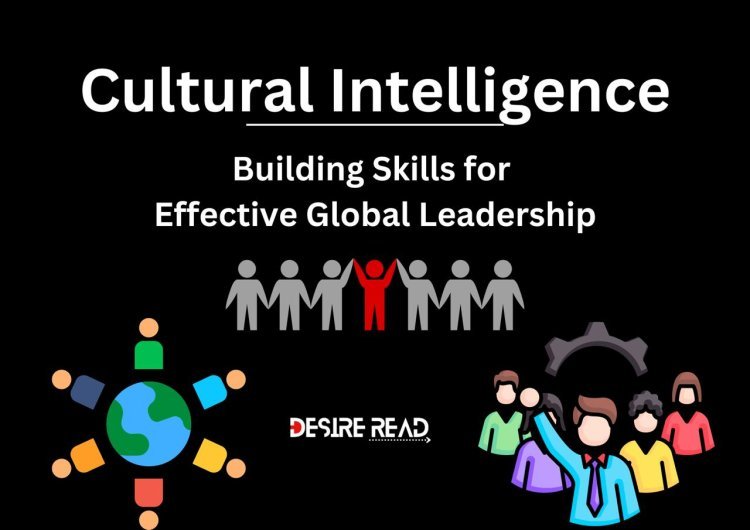Cultural Intelligence
Cultural Intelligence: Building Skills for Effective Global Leadership" is a comprehensive guide to developing the crucial skills needed to navigate diverse cultural landscapes with confidence and effectiveness in leadership roles.

Introduction
Cultural intelligence (CQ) is a vital talent for powerful worldwide leadership, specifically in modern-day and; in a multicultural and interconnected enterprise environment. This includes the potential to collaborate across cultures, display cultural awareness, and suppose severely. Studies have shown that leaders with excessive cultural intelligence are extra successful in go-cultural workplaces
Developing cultural intelligence is an ongoing system that requires leaders to be open to mastering, assigning their assumptions, and embracing new stories, together with immersing themselves in exceptional cultures via tour or language studying
In enterprises international, cultural intelligence is taken into consideration as an essential skill for managers because it helps bridge the distance between distinctive groups and produces superior outcomes. Therefore, cultural intelligence is a key competency for managers navigating the complexities of the worldwide economic system and handling it in a multicultural environment.
How to develop cultural intelligence?
People can attention to exceptional techniques and practices to develop cultural intelligence. Some powerful methods to grow cultural intelligence include:
- Relationship Building: Cultivate connections with human beings from extraordinary cultures to advantage a deeper understanding of their perspectives and values.
- Effective Communication: Improve communication abilities to make sure clarity and knowledge throughout cultural limitations.
- Flexibility: adapting and adapting behavior while interacting with people from exceptional cultures, due to the fact things do not continually pass as deliberate in cross-cultural interactions.
- Patience: Take time to analyze and adapt because expertise and accepting cultural variations require patience.
Continuous mastering and flexibility: Be open to gaining knowledge of and search for opportunities to immerse yourself in specific cultures, as an example via travel, language getting to know, or cultural alternate applications
Developing cultural intelligence is an ongoing method that requires commitment, effort, and time. By implementing these strategies, individuals can enhance their capability to navigate one-of-a-kind cultures, sell knowledge, empathy, and pass-border cooperation.
Cultural Intelligence: Building Skills
Cultural intelligence refers to the capability to adapt and function correctly in extraordinary cultural environments and conditions characterized with the aid of cultural variety. This involves recognizing and understanding distinctive cultures after which adapting your behavior and verbal exchange fashion to paintings successfully with people from unique cultures. Cultural intelligence is an important ability for each person who interacts with humans from different cultures and can be learned through developing four extraordinary elements: Will, Knowledge, Strategy, and Action. Organizations require cultural intelligence abilities as it enhances the competence of male or woman personnel and facilitates them to be triumphant throughout borders. Developing cultural intelligence permits humans to sing into the values, ideals, and attitudes of people from specific cultures and respond with conscious empathy and admiration.
what is cultural intelligence and why is it important for global leadership ?
Cultural intelligence refers to the ability to understand cultural differences, adapt to them and efficiently take advantage of different groups and companies. This includes knowledge of the norms, behaviors, and expectancies of different cultures and adapting yourself and your leadership style. Effective global leaders with properly evolved cultural intelligence actively paint on 4 capabilities: understanding different cultures, questioning their assumptions, showing humility, and using their information in mutually beneficial approaches.
Cultural intelligence is a key issue that determines the fulfillment of worldwide leaders in multicultural offices. In a state-of-the-art particularly digitized world, cultural intelligence is a strategic smooth talent important for management in a globalized world. Multinational agencies now encompass very diverse teams, and inclusion is high in the company schedule. As the worldwide business environment turns into extra intertwined, cultural intelligence has grown to be a necessity instead of a nice skill.
.
Examples of cultural intelligence in the workplace
Cultural intelligence inside the workplace may be demonstrated in some ways, such as:
- Effective communication: Cultural intelligence allows human beings to evolve their conversation style to be greater powerful whilst running with human beings from unique cultures. This calls for awareness of cultural nuances and sensitivity in verbal exchange
- .Positive work environment: Cultural intelligence contributes to the advent of a fine work environment by promoting expertise, empathy, and reputation of personnel from exclusive cultural backgrounds
- Global Team Collaboration: In a modern-day globalized world, cultural intelligence is vital for managers to bridge cultural differences and bring global teams together. It enables to create and maintain a successful collaboration in diverse cultural environments
Inclusive leadership: Leaders with high cultural intelligence are more inclusive, supportive, and effective in main numerous companies. They recognize and adapt to the cultural variations in their teams, resulting in higher crew dynamics and universal crew performance
In summary, it can be argued that cultural intelligence within the administrative center can be seen through powerful verbal exchange, selling high-quality paintings surroundings, promoting global crew collaboration, and promoting inclusive leadership. These examples highlight the significance of cultural intelligence in a modern diverse painting environment.
Conclusion
The conclusion drawn from diverse assets is that cultural intelligence is a key aspect of the fulfillment of global leaders in past cultural offices. Effective worldwide leaders with well-advanced cultural intelligence actively paint on 4 competencies: understanding different cultures, thinking about their assumptions, showing humility, and the use of their know-how in mutually useful methods. Organizations are endorsed to provide rigorous pass-cultural development programs to improve the cultural intelligence of center managers, as this is vital for managing extended uncertainty, challenges, and variety in a worldwide context. The outcomes endorse control training focused on adopting multicultural operations to instill cultural intelligence in managers of global operations. In summary, cultural intelligence is an invaluable asset and middle to powerful worldwide management, and its development and alertness are important to success in multicultural places of work.













